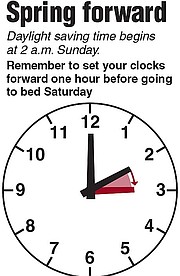It’s about time
Legislators hope Sunday’s daylight saving time switch will be the last
Sunday marks the beginning of daylight saving time, when Idahoans will join a dwindling majority of Americans who will set their clocks forward at 2 a.m. to 3 a.m., thus losing an hour of sleep while gaining an hour of afternoon daylight. It also marks the annual ritual of stories and blogs and Facebook posts about the merits and pitfalls the practice inspires, one I researched this year by exploring time through the enduring history of music.
Searching back catalogs for songs about time — or even mentions of time within songs — was the most relaxing (though certainly not the most efficient) 60 minutes this reporter could have spent Friday, as evidenced by Google’s unforgiving memory.
“Sign Of The Times Harry Styles lyrics,” the search history reads, followed immediately with “Time Of Your Life Green Day lyrics” and “Time After Time Cindi Lauper.”
Finding the right song lyric to begin a story about the setting of our collective clocks started with the classic (“The Longest Time” by Billy Joel) before leaping to the campy (“Back In Time” by Huey Lewis and the News) to the moody (“Time In A Bottle” by Jim Croce) to the everlasting (“Old Town Road” by Lil Nas X featuring Billy Ray Cyrus, which admittedly has nothing to do with time but is still a perfectly joyous song to play on a Friday). I settled on George Harrison’s “I Got My Mind Set On You” before calling it a day and getting back to work. (“It’s gonna take time,” he sings, “a whole lotta precious time.”) It’s a fun little rabbit hole, but it’s a rabbit hole nonetheless.
The Idaho Legislature is traveling down its own rabbit hole as we enter the stretch run of the 65th legislative session. Three bills currently wait on the docket that would impact the way Idahoans look at our wristwatches (or cellphones, or smartwatches, or sundials, if you’re so inclined). Whatever your thoughts on the matter, there’s a bill — and a song — for your liking.
“Time, why you punish me?”
— Darius Rucker, Hootie and the Blowfish
Rep. Christy Zito has been on a mission to exempt Idahoans from saving time since taking office in 2016. After fielding what she called dozens of requests, the Hammett Republican who recently announced her 2020 candidacy for the state Senate has long-held that changing our clocks back and forth each year is slowly chipping away at our collective health.
“My concern is for the health and safety for the citizens of our state,” Zito told the House State Affairs Committee in defense of her supporting legislation, House Bill 358.
Zito cited endless studies that detail an increased number of automobile accidents, heart attacks and economic challenges that accompany the twice-a-year tradition of changing the clocks. Her first attempt to abolish the practice failed in the House last year.
“This issue has been discussed for years in the Idaho Legislature,” Zito said. “There have been bills in Utah, Washington, Wyoming, Montana, Florida: Just about every state [has] broached this idea and come up with some sort of legislation that would take place when something happens at some time in the future … I firmly believe if Idaho will take an affirmative, positive step and do something, rather than to sit and wait for someone else to do something and for someone else to align, but to take a step and do something, other states will follow. I firmly believe that.”
While Zito has often voiced her concern for the health of Idahoans, she must again concern herself with the health of her bill this year. Despite opposition expressed by fellow House members about regional needs outweighing the force of the statewide bill — particularly the needs of people in North Idaho, as voiced by Dalton Gardens Rep. Vito Barbieri, who said Coeur d’Alene’s economic clock needs to sync with neighboring Spokane — HB 358 begrudgingly passed a committee vote and made it to the House floor. House Majority Leader Mike Moyle moved to send the bill back to State Affairs Feb. 6, all but ending its chances this session.
“Time is on my side. Yes, it is.”
— Mick Jagger, The Rolling Stones
Steve Vick supports the sentiment behind Zito’s push to abolish saving time.
“There are a number of studies that show there’s an increased number of accidents and health issues right around the time we change our clocks each year,” Vick said Friday. “It’s been going on long enough to say it’s not a coincidence.”
The senator also agreed, however, with Barbieri that the needs of the north cannot be forgotten at the behest of the south. This, he said, is one reason why his legislation has found the success HB 358 could not.
“The needs of Coeur d’Alene are often tied to the needs of Spokane,” he said. “It makes sense that we remain on the same time.”
The Washington Legislature recently voted to make saving time a permanent, year-round reality. It’s a decision that still requires federal approval before enactment, one that juggles several moving parts — including how California might eventually choose to follow suit — and one that doesn’t have an exact timetable on the horizon. Senate Bill 1267 provides that all parts of Idaho that live under the rule of the Pacific Time Zone — namely the north — will keep in time with Washington. His bill has not only made it out of the Senate State Affairs Committee, but it was voted out of the Senate unanimously and has been scheduled for a third reading in the Idaho House on Monday. While nothing in life is certain, its passage looks far more likely than HB 358’s chances for success this year.
“There’s quite a move, at least in the West, to keep going this direction,” Vick said. “There’s quite a move to make the changes that make the most sense for our citizens going forward.”
“Life is old there, older than the trees,
Younger than the mountains, growing like a breeze.”
— John Denver
In what’s been called a companion piece to SB 1267, Twin Falls Rep. Jim Patrick announced a bill that would essentially do for Mountain Time counties what Vick’s bill does for Pacific Time counties to the north: permanently tether all southern clocks to those of their economic neighbor, in this case Salt Lake City.
Senate Bill 1386 essentially permeates Mountain Time for those in the south once Utah follows suit. The bill was born in committee less than one week after the Utah Legislature voted to approve the measure and send the bill to Gov. Gary Herbert.
“Utah just recently passed legislation to ask to stay on savings year-round,” Patrick said to the Idaho Senate State Affairs Committee. “Oregon, Washington and North Idaho are working the same way. It leaves us down south as kind of an orphan.”
Utah could have voted to permeate Utah Standard Time, which would have equally ignored saving time while giving the extra hour to morning commuters. That move would not have required federal approval, as states have the right to opt out of saving time. But legislators in Utah said their constituents wanted the extra hour of sunshine in the evening.
Either way, Rep. Jeff Stenquist of Draper urged to approve the bill for a different reason during the Utah House Floor debate, one that Idaho legislators fear will one day wear on its citizenry.
“Colleagues, I plead with you,” he begged, “to vote for this bill so that we don’t ever have to have another Saving Time bill come up in front of this body.”





